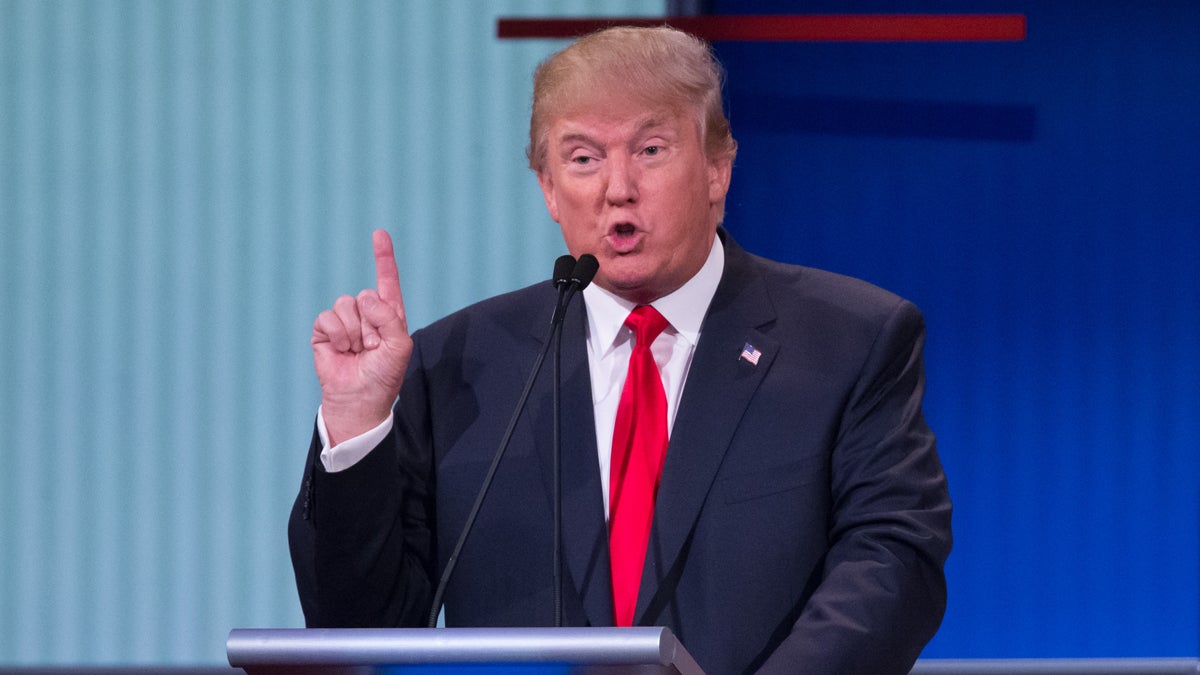Nasty politics has never pulled any punches
Listen
Republican presidential candidate Donald Trump during the first GOP debate. ((AP Photo/John Minchillo)
Bam! Bang! Pow!
If you listened to media reports on the first set of Republican debates earlier this month, you might have mistaken them for prize fights.
In the undercard, we were told, Carly Florina and Rick Perry “hammered” Donald Trump. Then came the prime-time main event, where the “combative” Trump “sparred” with Rand Paul and also with Fox news host Megyn Kelly.
Most of the candidates also took shots at Hillary Clinton and President Obama, who recently bemoaned the nasty tone of the GOP race. Obama singled out Ted Cruz—who called the president the leading state sponsor of terrorism—and also Mike Huckabee’s claim that Obama’s Iran nuclear deal threatened Israelis with another Holocaust.
“We have robust debates, we look at the facts,” Obama told a news conference during his visit to Ethiopia. “We don’t just fling out ad-hominem attacks like that because it doesn’t help inform the American people.”
But even with Donald Trump in the mix, our contemporary politics are actually much more polite—and much less malicious—than in earlier eras. We deceive ourselves when we pretend otherwise, by imagining some golden age of civility that never existed.
Consider our first contested presidential election, in 1800, which pit two of our most famous statesmen—John Adams and Thomas Jefferson—against each other. It’s tempting to imagine them as wig-clad philosopher-kings, deliberating high-minded ideas in a calm and reasoned campaign.
It’s also false. Jefferson’s supporters said that Adams had secretly plotted to have one of his sons marry King George III’s daughter, to bring America back under the British crown. Adams’ camp charged that if Jefferson were elected the young nation would descend into anarchy and violence.
“Murder, robbery, rape, adultery, and incest will all be openly taught and practiced,” one anti-Jefferson newspaper predicted, “the air will be rent with the cries of the distressed, the soil will be soaked with blood, and the nation black with crimes.”
Another editorialist painted an even bleaker picture of life under a Jefferson administration. “Look at your homes, your parents, your wives, and your children,” he warned. “Are you prepared to see your dwellings in flames, hoary hairs bathed in blood, female chastity violated, or children writhing on the pike?”
Things weren’t much different in 1828, when John Quincy Adams—son of Jefferson’s opponent—faced off against Andrew Jackson. Jacksonians called the younger Adams “King John the Second,” claiming that he too sought to reunite America with its colonial master. Most bizarrely, they charged that Adams had procured a young American virgin as a gift for Russian czar Alexander I.
In reply, Adams’ team accused Jackson of marrying his wife before she was divorced from her first husband. They also raised questions about Jackson’s own parents, invoking America’s ugliest tradition of all: racism.
“General Jackson’s mother was a COMMON PROSTITUTE, brought to this country by the British soldiers,” one newspaper blared. “She afterward married a MULATTO MAN, with whom she had several children, of which number General JACKSON IS ONE.”
When James Polk ran against Henry Clay in 1844, Polk supporters said that Clay “spends his days at the gambling table and his nights in a brothel.” Eight years later, in 1852, opponents of Franklin Pierce spread the rumor that “The Fainting General”—as they called Pierce—had passed out during a critical moment in the Mexican-American War.
Race raised its nasty head again in 1860, when Democrats charged the GOP nominee Abraham Lincoln was actually black. “He is a lank-sided Yankee of the uncomeliest visage, and of the dirtiest complexion,” a Southern newspaper declared. “Faugh! After him, what decent white man would be President?”
And four years after that, opponents claimed that Lincoln would institute interracial marriage if re-elected. One magazine compiled a master list of insults lobbed at the president: Liar, Thief, Braggart, Buffoon, Usurper, Monster, Ignoramus Abe, Old Scoundrel, Perjurer, Robber, Swindler, Tyrant, Fiend, Butcher.
So it went, through accusations that Ulysses S Grant was a drunk, that Grover Cleveland fathered an illegitimate child (he did), that Warren Harding was actually black, and that Franklin Roosevelt was secretly Jewish. And we heard vestiges of that tradition in the recent “birther” attack against President Obama, which suggested that he, too, was not really what he seemed to be.
But the birther screed never made it into mainstream campaign politics, despite the best efforts of Donald Trump. We still have our bullies and our demagogues, of course, and we always will. But even in the time of Trump, our political discourse is vastly more elevated than in the so-called good old days. And that’s good news for all of us.
_________________________________________________Jonathan Zimmerman is teaches history and education at New York University. He is the author of Too Hot to Handle: A Global History of Sex Education, which was published in March by Princeton University Press.
WHYY is your source for fact-based, in-depth journalism and information. As a nonprofit organization, we rely on financial support from readers like you. Please give today.

